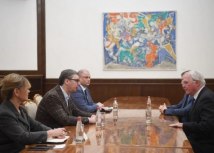Continuing obstacles to the reintegration of Serb returnees in Croatia
HRW report titled "A Decade of Disappointment: Continuing Obstacles to the Reintegration of Serb Returnees," analyzes the key human rights problems affecting returning Serbs, including violence and intimidation, the loss of housing rights and limited access to state employment.
Human Rights WatchBetween 300,000 and 350,000 ethnic Serbs left their homes in Croatia during the 1991-1995 war in the former Yugoslavia. Most fled in August 1995, when Croatian government forces overran the territories that had been occupied by rebel Serb forces. It is this area, known as the “Krajina,” to which most Serbs are returning.
Government figures from April 2006 suggest that 120,549 Serb refugees have returned to Croatia since 1995. The actual number is believed to be much lower—many of those who are registered as returnees make only occasional visits to Croatia while continuing to live in Serbia or in Bosnia and Herzegovina, and only 60-65 percent of the registered returnees are believed to remain permanently in Croatia. Overall, within Croatia’s population of 4.4 million, Serbs made up 4.5 percent at the 2001 census.
The rate of return has slowed significantly in recent years. In 2005, the government registered 4,745 refugee returns from Bosnia and from Serbia and Montenegro, while in 2004 the respective figure was 12,478. A recent Croatian government assessment suggests that only 20,000 to 25,000 Serb refugees remain interested in return to Croatia.
The figure is broadly similar to the results of a survey commissioned by the Organization for Security and Co-Operation in Europe (OSCE) in 2004, showing that 14 per cent of the interviewed sample of Croatian Serb refugees abroad manifested an intention to return to Croatia in the coming years. International human rights law protects the right of refugees and exiles to return to their homes.
The right to return is most clearly enshrined in the International Covenant on Civil and Political Rights (ICCPR) under its provisions on the right to freedom of movement, including the right to enter one’s own country. As in the case of all displaced people, those unable to return to a former home because it is occupied or has been destroyed, or those who have lost property, are entitled to compensation.
Human Rights Watch has so far issued three reports about the return of Serb refugees to Croatia. Eleven years after the war, with the prospect of large scale returns now unlikely, it is more important than ever to focus attention on the human rights situation of those Serbs who have already returned. There is, however, no sharp line separating the two sets of issues: The preconditions for reintegration are identical to the preconditions for return of the remaining refugees who are contemplating doing so.
Human Rights Watch is particularly concerned about the following obstacles to full respect of human rights of the Serbs who have returned to Croatia: the lack of progress in resolving the issue of tenancy rights stripped from Croatian Serbs during the war; increase in the number of incidents of ethnically motivated violence and harassment against Croatian Serbs; and the continuing under-representation of the Serb minority in the state administration, the judiciary, and the executive bodies and administration of self-government units.
Other concerns include discrimination in the supply of electricity to Serb returnee communities, slow progress in repair and reconstruction of Serb houses damaged or destroyed in the war, and, in one part of the country, the continuing inability of the Serbs to have full access to their agricultural land.
Under the ICCPR, the International Covenant on Economic, Social and Cultural Rights,10 and the International Convention on the Elimination of All Forms of Racial Discrimination, Croatia has committed itself to ending discrimination based on descent and ethnic origin, among other grounds. It must guarantee that basic rights, including the rights to the security of the person, to employment, to housing, and to a remedy when those rights are violated, can be exercised without discrimination.
Croatia must take effective measures to review governmental policies, and to change any laws that have the effect of creating or perpetuating discrimination. And it must bring to an end, by all appropriate means, ethnic discrimination by any persons, groups or organizations.
Since October 3, 2005, Croatia has been an official candidate for membership in the European Union (EU). That process creates a dual responsibility—on the authorities in Zagreb to ensure that the human rights of all persons living in Croatia are respected, and on the EU to ensure that Zagreb lives up to the human rights obligations befitting a candidate country.
| Download full report HRWcroatia0906.pdf (309.36 KB) |




